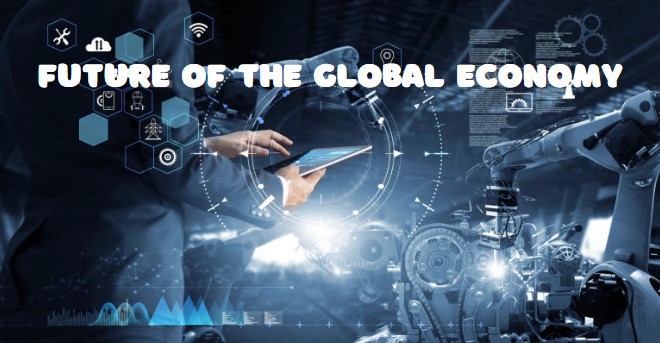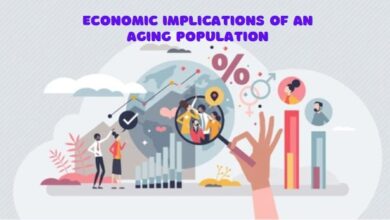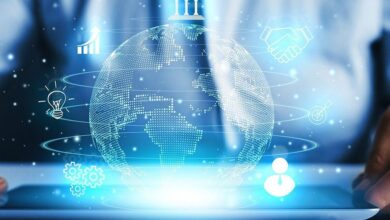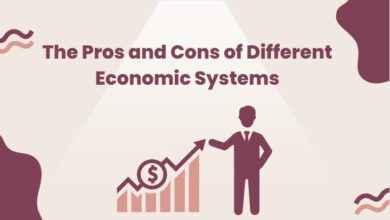The Future of the Global Economy in Light of Increasing Automation and AI

The rise of automation and artificial intelligence (AI) is having a significant impact on the global economy. While these technologies have the potential to increase productivity and efficiency, they also raise concerns about job displacement and income inequality. In this article, we will explore the potential impact of automation and AI on the future of the global economy.
The Impact on Job Displacement
One of the biggest concerns about automation and AI is the potential for job displacement. As machines and algorithms become more capable of performing tasks that were previously done by humans, there is a risk that many jobs will be eliminated. This is particularly true for jobs that involve repetitive or routine tasks, as these are the easiest to automate.
However, it’s also important to note that while some jobs may be replaced, automation and AI can also create new job opportunities. For example, the increased use of automation in manufacturing can lead to the creation of new jobs in areas such as maintenance and programming. Additionally, as automation and AI become more prevalent, there will be a growing need for people with the skills to design, implement, and manage these systems.
The Impact on Income Inequality
Another concern about automation and AI is that it could exacerbate income inequality. As machines and algorithms take over jobs that were previously done by people, those who are displaced may struggle to find new employment that pays as well. Additionally, those who own and control the automation and AI systems may benefit disproportionately, further widening the gap between the rich and the poor.
However, it’s also possible that automation and AI could lead to greater equality. For example, if machines and algorithms are used to automate tasks that are currently done by low-paid workers, this could lead to an increase in wages for these workers. Additionally, as automation and AI become more prevalent, the cost of goods and services may decrease, which could benefit everyone, regardless of their income level.
The Impact on Economic Growth
The impact of automation and AI on economic growth is a complex topic. On one hand, these technologies have the potential to increase productivity and efficiency, which could lead to faster economic growth. Additionally, as automation and AI become more prevalent, they can create new industries and job opportunities.
However, it’s also possible that automation and AI could lead to slower economic growth. If machines and algorithms take over jobs that were previously done by people, this could lead to lower demand for goods and services. Additionally, if automation and AI lead to greater income inequality, this could result in less consumer spending and slower economic growth.
The Impact on Small Businesses
Small businesses are often the first to adopt new technologies and automation, as they are looking for ways to increase efficiency and reduce costs. However, this can also put them at a disadvantage when competing against larger companies that have more resources to invest in automation and AI.
On the other hand, small businesses can also benefit from automation and AI by increasing their productivity and competitiveness. Automation can also help small businesses expand their customer base and reach new markets through the use of e-commerce and digital marketing.
The Impact on International Trade
Automation and AI can also have a significant impact on international trade. As automation increases productivity and reduces costs, it can lead to greater exports and more favorable trade balances. Additionally, automation can also help companies navigate the complexities of international trade regulations and compliance.
However, it’s also possible that automation and AI could lead to trade disputes and protectionism. As automation and AI make it easier for companies to move production to different countries, this could lead to job displacement and economic disruption in certain areas. Additionally, as automation and AI become more prevalent, there may be concerns about the transfer of sensitive technology and data across borders.
Preparing for the Future
As automation and AI continue to advance, it’s important for individuals, businesses, and governments to take steps to prepare for the changes that are coming. This includes investing in education and training programs that will help people develop the skills they need to succeed in the new economy. Additionally, governments and businesses should consider policies and programs that will help those who are displaced by automation and AI to find new employment.
It’s also important for businesses to consider how they can use automation and AI to create new products and services, rather than simply replacing human workers. By thinking creatively and investing in innovation, businesses can stay competitive and position themselves for success in the future.
The Impact on Consumer Behavior
As automation and AI become more prevalent, they will also have an impact on consumer behavior. With the use of automation and AI in e-commerce, online shopping will become more convenient, and consumers will have access to a wider range of products and services. Additionally, automation and AI can also help consumers make more informed purchasing decisions through the use of personalization and recommendation algorithms.
However, automation and AI can also lead to a decrease in face-to-face interactions, which can negatively impact consumer trust and engagement. Additionally, automation and AI can also lead to an increase in data privacy concerns, as consumers become more aware of the ways in which their data is being collected and used.
The Impact on Regulations
As automation and AI continue to evolve, they will also have an impact on regulations. Governments will need to adapt their regulations to ensure that automation and AI are used in an ethical and responsible manner. This includes addressing issues such as data privacy, cybersecurity, and intellectual property rights.
Additionally, governments will also need to consider the potential impact of automation and AI on employment and income inequality. This could include policies such as retraining programs and unemployment benefits for those who are displaced by automation and AI.
The Impact on Social Structures
As automation and AI continue to advance, they will also have a significant impact on social structures. Automation and AI can lead to increased income inequality and job displacement, which can have a negative impact on society. Those who are displaced by automation and AI may struggle to find new employment, which can lead to social unrest and poverty.
Additionally, automation and AI can also lead to a decrease in human interaction and the erosion of traditional skills, which can have a negative impact on community cohesion. Furthermore, automation and AI can also lead to a decrease in the number of low-skilled jobs, which can lead to a decrease in social mobility and opportunities for those from lower socioeconomic backgrounds.
The Impact on Cybersecurity
As automation and AI become more prevalent, they will also have a significant impact on cybersecurity. Automation and AI can make it easier for cybercriminals to launch attacks and steal sensitive information, as they can automate the process of identifying and exploiting vulnerabilities. Additionally, automation and AI can also make it easier for cybercriminals to evade detection and cover their tracks.
Furthermore, automation and AI can also lead to a greater reliance on technology, which can make organizations more vulnerable to attacks. As automation and AI become more prevalent, it’s essential for organizations to invest in cybersecurity measures to protect themselves and their customers from cyber threats.
The Impact on Ethical and Moral Issues
As automation and AI continue to evolve, they will also raise ethical and moral issues. For example, the use of automation and AI in decision-making can lead to bias and discrimination, as algorithms can perpetuate the biases of their designers. Additionally, automation and AI can also raise questions about accountability, as it can be difficult to determine who is responsible for the actions of autonomous systems.
Furthermore, automation and AI can also raise questions about the future of work and the role of humans in society. As automation and AI become more prevalent, it’s essential to consider the ethical and moral implications of these technologies and to develop guidelines and regulations to ensure that they are used in a responsible and ethical manner.
Conclusion
In conclusion, the future of the global economy in light of increasing automation and AI is complex, and it’s essential to consider the potential impact on job displacement, income inequality, economic growth, small business, international trade, consumer behavior, regulations, social structures, cybersecurity, and ethical and moral issues. It’s important for individuals, businesses, and governments to work together to prepare for these changes and ensure that the benefits of automation and AI are shared by all.



